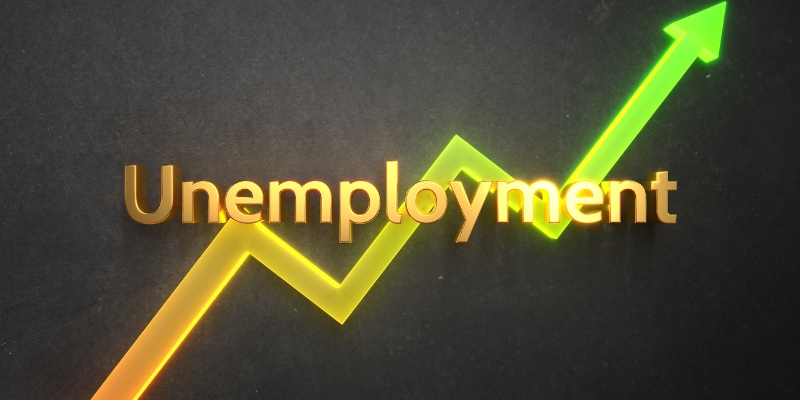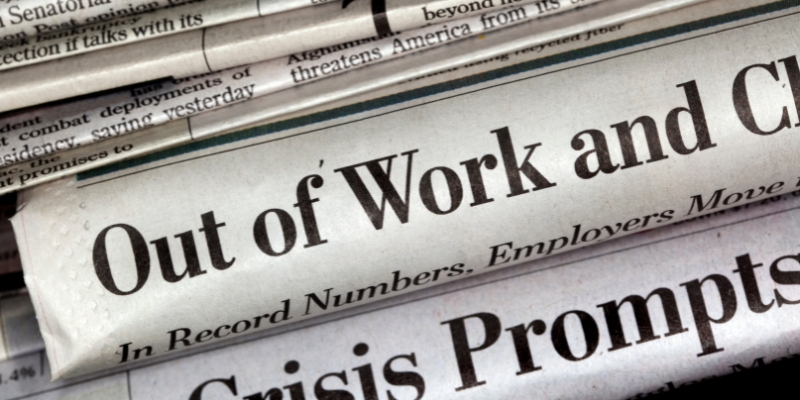Decoding the Comprehensive Cost of Unemployment on the Economy
Nov 14, 2023 By Rick Novak
The Iceberg of Economic Challenges
Unemployment is the visible result of deeper economic issues. These costs are complicated, affecting not just the unemployed but the entire economic machinery.
The Immediate Impact: Consumer Spending and Economic Growth
The Unemployment-Spending Paradox
Reduced Consumer Spending
Losing a job leads to a direct cut in spending. Without a steady income, households tighten their belts, reducing expenditure on non-essential goods and services, which further contracts economic activity.
Retail and Service Sectors: The First Casualties
The retail and service industries, dependent on consumer spending habits, often feel the first sting of unemployment's impact as their revenues decrease in response to a drop in demand.

Government Finances: The Balancing Act
Shrinking Tax Base, Expanding Deficits
A decline in employment results in a smaller tax base, challenging governments to maintain public services despite reduced income and increased welfare expenditures, thus expanding budget deficits.
The Unseen Trade-off: Welfare over Development
Funds diverted to social welfare to cushion the blow of unemployment are funds not invested in development projects, which could have long-term benefits for economic growth.
Business and Market Dynamics: Confidence in Crisis
Investment Hesitation: A Symptom of Uncertainty
Economic uncertainty caused by high unemployment can reduce business investment, preventing innovation, expansion, and job creation.
The Employment-Market Confidence Feedback Loop
A vibrant job market fosters consumer and business confidence, while a slow economy can create a feedback loop of diminishing confidence, perpetuating a poor economy.
Social and Health Implications of Unemployment: The Unquantified Losses
The Psychological Impact
Unemployment can take a severe psychological toll on individuals, leading to a decline in mental health, which has broader social implications.
Public Health and Safety: The Overlooked Victims
The health system often bears the cost of unemployment, with increased incidences of stress-related illnesses and the potential for a rise in public safety issues.
The Vicious Cycle: Long-term Unemployment Woes
Skill Atrophy and Obsolescence
Extended periods of unemployment can lead to skill degradation, making it harder for individuals to re-enter the workforce and contribute to the economy.
The Youth Unemployment Challenge
Young individuals facing unemployment may struggle to gain the skills and experience needed to secure stable, well-paying jobs, perpetuating a cycle of underemployment and economic stagnation.
Global Economic Repercussions
International Trade and Investment Impacts
Unemployment in one region can domino effect international trade and investment as consumption patterns shift and economies interlink.
Policy Response: A Need for Global Solidarity
In an interconnected world economy, collaborative policy responses and support mechanisms are essential to address unemployment's far-reaching impacts.
Breaking Down The Cost of Unemployment to the Economy
For Individuals:
Financial Struggles: Imagine not having a job and struggling to make ends meet. Bills pile up, and savings disappear, leading to a financial rollercoaster.
Health Hurdles: Being jobless can be a real downer for mental and physical health. Stress, anxiety, and feeling blue can become your unwelcome companions. Plus, you might skip doctor visits because of tight pockets.
Skills Loss: Have you heard the saying, "Use it or lose it"? It applies to job skills, too. Long-term unemployment can make you a bit rusty, making it more challenging to snag a new gig.
Social Isolation: Work is not just about making money; it's also where you socialize. With a job, one can feel connected and connected to the community.

For Society:
Increased Government Aid: More jobless people mean more reliance on government help. That's more money being poured into support programs, straining budgets.
Crime and Tensions: When people are strapped for cash, they might turn to the wrong side of the law. It can also stir up protests and conflicts as frustration brews.
Family Dynamics: Unemployment can stir the pot at home. Stress can lead to more arguments, possibly even breakups, affecting kids' education and happiness.
Community Effects: Places with high unemployment might feel a bit gloomier. Less spending means fewer local services, and people might not engage as much in community activities.
For the Country:
Economic Slowdown: When many folks can't find work, the country's economic engine sputters. It's like a car running on half its cylinders.
Less Tax Money: Jobless folks pay less taxes, which means less cash in the government's piggy bank. That affects funding for essential stuff.
Government Spending: The government has to dig deeper into its pockets to help those without work, leading to budget issues and more national debt.
Business Blues: High unemployment can put a damper on spending. Businesses feel the pinch, some even closing shop, worsening the job hunt.
For the World:
Trade Imbalances: Countries with lots of jobless folks might buy less from others, causing trade imbalances and shaking up the global economy.
People on the Move: When jobs are scarce at home, people might become globe-trotters searching for work. This can spark significant changes for their home country and the one they migrate to.
Global Economic Brake: Unemployment can break global economic growth as people tighten their purse strings and production takes a hit worldwide.
Aid Dependencies: Countries struggling with high unemployment might lean on international aid, stretching the resources of donor nations and global organizations.
Conclusion: Beyond the Numbers: A Call to Action for Economic Resilience
The actual cost of unemployment extends well beyond the loss of income for individuals. It encapsulates a decline in consumer spending, a blow to tax revenues, dampened business confidence, societal stress, and international economic tremors. Addressing unemployment requires not just short-term fixes but a sustained, holistic approach that promotes economic resilience, social well-being, and a proactive stance toward global cooperation and support. As we navigate economic downturns, the collective response to unemployment will shape the stability and growth of economies worldwide.

Rick Novak Nov 16, 2023

Kelly Walker Nov 14, 2023

Rick Novak Nov 14, 2023

Kelly Walker Nov 14, 2023

Rick Novak Nov 16, 2023

Rick Novak Nov 15, 2023
